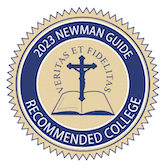Student & Alumni News
Grad Publishes Guide to Christian History Rudiments of Christian History: An Outline of Persons, Events, and Teachings is a new book by Michael Petruzzelli (MA in Religious Studies, 2001), an educator who holds several degrees and taught theology at a Catholic high school in the Archdiocese of Washington, D.C., for 10 years. The book was published in April by Christian Publishing, Inc.
Written in the format of an informal outline, Petruzzelli’s book presents a summary of some of the major topics of the 2,000-year+ span of Christian history. He provides various interpretations of causal relationships of key events, insight regarding historical persons who significantly impacted the course of Christian history, and a concise explanation of basic Christian teachings and theologies. You can review a synopsis of the book on YouTube or purchase the book in bookstores or on Amazon.
Alumnus to Be Ordained a Deacon Recent graduate Asadur M Minasian, who earned his MA degree in Theology in July 2021, will be ordained to the Sacred Order of Deacons by His Excellency Bishop Mikael Mouradian, Eparch of the Armenian Catholics in the U.S. and Canada. The event will take place at St. Mark’s Armenian Catholic Church in Wynnewood, Pennsylvania, on Sunday, September 12.
Let the Perpetual Light Shine upon Her After a life filled with blessings, CDU graduate May Gay Moore, 78, entered eternal life on August 11, 2021. A wife and mother, May’s greatest interest and passion was her Catholic faith. She taught CCD and in the RCIA program at the Little Creek Catholic Chapel in Virginia Beach, Virginia. She earned her Master of Arts degree in Theology at age 64, an accomplishment of which she was immensely proud.
Thesis Focuses on St. John Paul II’s Insights into the Christian Family
Elizabeth Gillson recently graduated from CDU with a Master of Arts degree in Theology. Her thesis, “Recalling God’s Design for the Family: A Review of John Paul II’s Theology of Family as Expressed in Familiaris Consortio,” has been
published in the Summer 2021 issue of Digital Continent.
Gillson shares insights from John Paul II on the Christian family. Professor Chris Padgett’s review exclaims, “In an age confused and often at odds with Catholic teachings of marriage and family, I found Gillson’s thesis an excellent reminder that the Catholic Church continues not only to uphold the integrity of its teachings in this critical area but also adapts them to meet modern challenges.” Enjoy reading her thesis at https://en.calameo.com/read/00616140268a1fa7fd06d.
Elizabeth and Michael, her husband of 25 years, are raising their 10 children in the Diocese of Arlington. She is pursuing a career in theological writing and research. You may also read her scripture reflections for youth at achildscatholicscripturestudy.com.
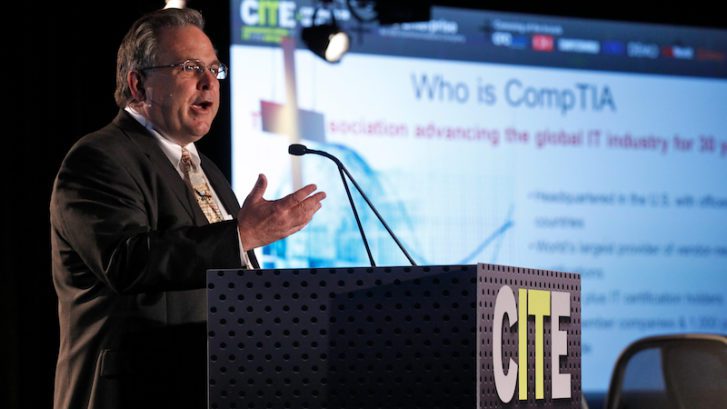
Deacon with Fascinating Career History Joins CDU Faculty
At St. Francis of Assisi Catholic Church in Colorado Springs, Colorado, Permanent Deacon Rick Bauer delivers a powerful sermon on the Eucharist as the true body and blood of Christ. He challenges the widely held belief among many sitting in the pews today that the Eucharist is symbolic. He concludes, “How about it, Catholics? As it becomes more difficult to accept this teaching, more will walk away, because there will always be convenient, palatable substitutes for the flesh and blood of Jesus Christ. As for me and my family, in the Communion line, when they say ‘The body and blood of Christ,’ I will say ‘Amen.’” To further make his point, he has prepared a two-page parish bulletin insert that supports the real presence of Christ in the Eucharist with passages from Scripture, the Catechism, and the words of the Fathers of the Church.
Deacon Rick Bauer recently joined CDU’s faculty and will teach SCRPT 210 Reading Scripture Theologically and SCRPT 520 Pentateuch. He holds a ThM in Hebrew Bible from Harvard University Divinity School, an MA in Biblical Theology from The Augustine Institute, an MSc degree in the Management of Technology from the Wharton School of Business at the University of Pennsylvania, and an MA degree in English from the University of Florida.
Deacon Rick is also a published author of three books, a technologist, and a member of the Permanent Diaconate Formation Program teaching faculty for the Diocese of Colorado Springs, where he has taught since his ordination in 2011, preparing groups of men–and their wives–for the challenges of being an ordained servant of Christ. He currently serves as the review editor for The Colorado Catholic Herald as well.
A revert to the Catholic faith, Deacon Rick Bauer’s professional background includes stints as a Protestant minister in the Church of Christ, technology manager, consultant on cults for the FBI, and chief technology officer for the U.S. Presidential Inaugural Committee & Presidential Transition Team for President George W. Bush and Vice President Richard Cheney in 2000 and 2001. His career path—and faith life–have taken a long and circuitous path.
Deacon Rick was raised in a Catholic family and attended Catholic school halfway through high school, but he left the Church as an undergraduate at the University of Florida after being invited to an informal bible study. “I had accumulated a lot of ‘Catholic stuff’ but did not have it in any coherent form, nor could I recall anything much of value when I got to college,” he says. “I know what attracted me on campus to the evangelical Protestant outreach was their confidence in their biblical understanding (far more than mine), their friendliness and willingness to invite me to an informal bible study,” he says.
Though the bible study was billed as nondenominational, it turned out to be quite anti-Catholic. While he had serious questions about leaving the Faith and being baptized as a Protestant, there were no Catholic resources on campus for guidance, and he became a member of the Church of Christ.
“A lot of Catholics end up losing their faith in the first semester,” Deacon Rick says. “Most Catholics leave their faith from age 18-22, and only a few Catholics are really paying attention to this. That’s why my wife and I support the FOCUS outreach programs going on at many campuses in the United States, and here in the University of Colorado system,” he adds.
After graduating, he decided to forgo law school to join the Church of Christ ministry training program. The church was growing rapidly throughout the south, and he was offered a position as a campus minister at the University of Arizona, Tucson. Membership in the campus ministry swelled under his direction, but the rapid growth of the Church, lack of structure, and inexperience of the leaders led to splits in the church and disillusionment of the members. “Ignorance doesn’t scale very well,” he says. He returned to the University of Florida to start a school of ministry and pursue a Master’s degree. Eventually, the leadership of the church in Gainesville became unaccountable, and Deacon Rick left for Boston to finish his Master’s degree in Hebrew bible at Harvard University’s Divinity School. At the time, he was still a minister in the church.
The more Deacon Rick studied and reflected on the bible at Harvard, the more he realized there were holes in Protestant theology and that the Old Testament didn’t need to be taken word for word as those in the evangelical movement believe.
But his renewal in the Catholic faith was ultimately driven by his realization that the Eucharist is truly the real presence of Christ; he remembered a wonderful experience he had had receiving Christ at Mass as a child. He resigned from his ministerial position in the Church of Christ, drawing ostracism and harassment from members. Toxic Christianity: The International Church of Christ/Boston Movement Cult, published in 1994, details his negative experiences in the movement. As a guest on EWTN’s The Journey Home, he tells the story of his return to the Catholic (the episode is available on YouTube).
After completing his degree at Harvard, he returned to Washington, D.C., to work as a technology manager in his father’s business and study at The Catholic University of America. One day in February 1993, he received a phone call. “It’s a strange call when the secretary says, ‘Mr. Bauer, FBI on line 2!’” he says. With a dangerous situation brewing at the Branch Davidian compound in Waco, Texas, the FBI had called Harvard University for advice on dealing with cults, and his professor had recommended him as a consultant.
While in Boston, Deacon Rick had spoken with his advisor, “a brilliant man who was helping with his faith transitions,” about how some of the same settings for apocalyptic conflict in the Hebrew Bible might also occur with millennial expectation at the turn of the century, so in the 1990s he studied groups that had a biblical veneer but were cultic.
The situation in Waco tuned into a violent 51-day standoff between members of the sect and federal agents, four of whom were killed. Two members of the sect were killed in the fighting, and then a fire swept through the compound. “We had been studying this very issue–a cult-like, violent group, apocalyptic mindset, yet with a biblical exterior,” Deacon Rick says. “It was very interesting, and I consulted without pay, but it unfortunately resulted in needless violence and the death of 76 Branch Davidians, including 25 children, two pregnant women, and David Koresh (aka Vernon Howell) himself.”
In the 1990s Deacon Rick served as executive director for several technology organizations. He was working as the chief information officer for a school in Philadelphia, when James Baker III, an alum, board member, and parent, invited him to serve as a chief technology officer for the U.S. Presidential Inaugural Committee & Presidential Transition Team for President George W. Bush and Vice President Richard Cheney in 2000 and 2001.
Given the Bush/Gore election issue and the brief time for presidential transition, the inauguration, and staffing, the new administration was cut by about 50%. “Since by then I had an IT background, they asked me to help out,” Deacon Rick says. “It was a wonderful feeling to watch a hotly contested election get resolved and a peaceful transition of power take place,” he adds. “It made me proud to be a citizen of our great country.”
Deacon Rick eventually took a technology job in Colorado, where he was formally accepted back into the Catholic Church after years of study and consideration. “I was told by a Jesuit priest, ‘you would make a pretty good deacon’ soon after I was formally accepted back into the Catholic Church,” he says. “With all the years I had served as a Protestant minister, it was encouraging to have a few men in my life feel that there was something ‘still left in the tank’ with regard to ministry or teaching.”
“I had to “unlearn” a lot of things in my 5-year formation process, but my preparation in the biblical languages and in biblical studies could find fruitfulness, which has been humbling,” he says.
From Our President
We at CDU knew that the Congregation for Catholic Education was preparing recommendations for Pope Francis regarding the use of distance education in ecclesiastical universities. During a brief visit to Rome in late November 2017, I met with Archbishop Zani and his staff to share our expertise in online teaching pedagogies and student support. I am sure that the continuing developments in distance learning at the Vatican reflect the positive contributions of CDU.
Pope Francis, in his Apostolic Constitution Veritatus Gaudium (December 8, 2017), reflects his commitment to educating the peripheries including prisoners, migrants, the homeless, monks and contemplative nuns, and even busy bishops. This echoes CDU’s mission to serve the underserved and to educate the hearts of those who serve them. Those of us privileged to work at CDU for many years have marveled at our inclusive learning community and the students who find their way to us. The first graduate degree awarded by CDU, around the Jubilee Year 2000, went to a French woman in Paris who uses a wheelchair for mobility and has since earned her doctorate. CDU has awarded bachelor’s and master’s degrees to prison inmates through our correspondence curriculum and educated a number of contemplative nuns, brothers, and priests through our online MA degree program in Theology. Today we have a growing pastoral MA degree program for Catholic educators and directors of religious education that is offered completely online and in service to dioceses, especially the Diocese of Brooklyn’s Holy Spirit Institute.
In the words of Archbishop Zani, “There are many professionals who would like to acquire some theological, philosophical, or anthropological formation, and they are knocking on the doors of our institutions; we can’t ask them to attend like young students who are just beginning their academic journey.”
CDU is at home in the digital world. We congratulate our students and graduates who accepted the invitation to be pioneers with us in Catholic higher education. They reflect the power of CDU’s theological education that educates the human person with rigor and holistic formation, yet offers the freedom and flexibility that is essential today.
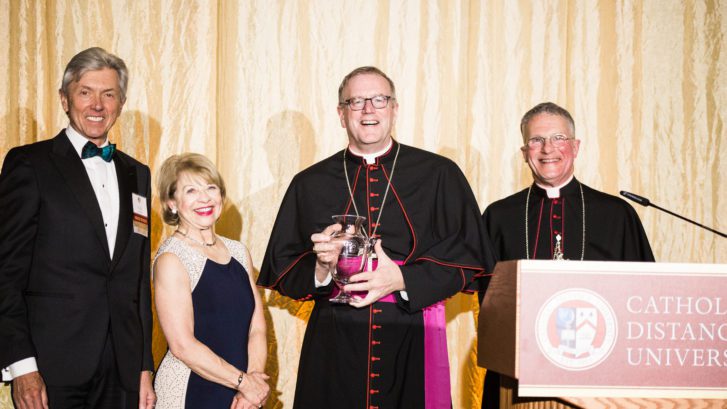
Bishop Robert Barron Receives CDU’s Highest Honor
Bishop Robert Barron receives Founders Award at the 38th Gala. From left to right: CDU Chairman Stephen D. Pryor, President Dr. Marianne Evans Mount, Bishop Robert Barron, and Chancellor Archbishop Timothy P. Broglio.
The November 18th Gala offered supporters, graduates, faculty, staff, and students an opportunity to celebrate the university’s 38th year and to look toward its future. The Academic Convocation Mass, with principal celebrant University Chancellor Archbishop Timothy Broglio, included a graduation ceremony for the classes of 2020 and 2021.
The Gala program featured Bishop Robert Barron, Auxiliary Bishop of Los Angeles and founder of Word on Fire, who received the Founders Award, CDU’s highest honor, for his use of the internet and social media to spread Christ’s teachings throughout the world. His work dovetails with CDU’s own mission to communicate the mind and heart of the church in a digital world. Watch the Gala program and Mass videos!
We look forward to celebrating with you in 2022!
Join us for a Free, Live Open House on August 17th!
Are you looking for a theology program that is 100% faithful to the Church, 100% online and easily fits into your busy schedule? Then sign up for our Online Open House being held this Tuesday, August 17, at 7 p.m. (EDT).
This event will introduce you to our different theology degree and certificate programs so you can choose the right program for you.
You’ll also get:
- A chance to hear from our admissions director, dean, director of student life, and professors about what sets CDU apart from other online universities.
- An overview of several fascinating courses at the undergraduate and graduate levels that will introduce you to the
study of theology. - Information on transferring credits, ensuring you a smooth transition into our program, and the opportunity to finally finish your undergraduate
degree. - An overview of the online Student Life Center, where you’ll obtain resources to help you successfully complete your degree.
- Breakout sessions to ask our dean and professors questions.
Be sure to stick around until the end of the webinar, where you’ll have a chance to win free CDU gear and books by our professors!
The event will last about 40-50 minutes, and it’s completely free. Once you’re through, you’ll be well-positioned for an easy transition into one of our online theology degree programs.
Register Now!
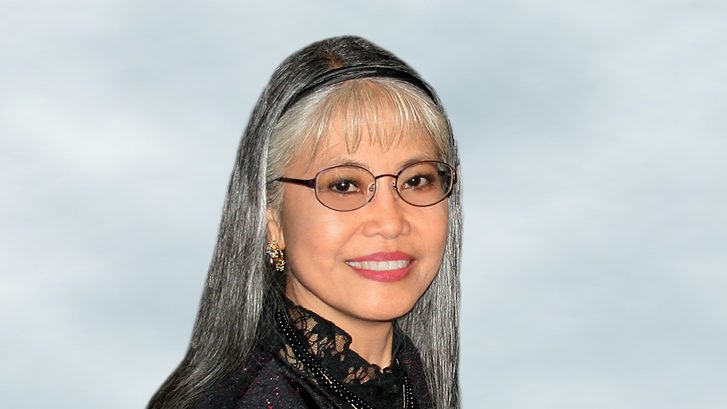
Psychiatrist Treats Patients with Justice and Charity
Dr. Araceli V. Lardizabal-Carnazzo, MD, MA (Catechetical Diploma, ‘15; MA in Theology, ‘16), is a forensic psychiatrist and active in parish ministry in the Diocese of Monterey, California. She was working as a staff psychiatrist in a forensic hospital when she began studying theology at the graduate level and then added the Catechetical Diploma to better impart her enriched Catholic faith to others in an engaging way.
Forensic psychiatrists practice in the medical field that interfaces with the law and the court system and treat patients in a hospital, outpatient, correctional, crisis, or emergency setting. They must accurately diagnose patients; soundly prescribe psychotropic medications and/or psychotherapies; and make proper clinical judgments as the team leader in the treatment planning conferences that are held with the psychologists, nurses, social workers, psychiatric technicians, and each patient.
“Forensic psychiatry can gain much from Theology to promote the emotional health and the spirituality of the patients,” Dr. Lardizabal-Carnazzo says. Studying theology helped Dr. Lardizabal-Carnazzo impart her work with the virtues of justice and charity. “As a Christian Catholic forensic psychiatrist, in justice, from which flows the virtue of religion, I give to God all the glory that is His due for all that is good in me, including my gifts of medical acumen and competence, moved by love for Him above all as I serve Him through my psychiatric patients,” she explains. “And in justice and charity, I give to the patients what is their due, moved by love that wills their highest good, in serving them, in imitation of the Divine Physician, as their psychiatrist.”
In addition to making appropriate consultations on complicated cases, a grounding in Theology and Catholic social teaching also facilitates her interactions with the other specialty doctors, forensic colleagues, pharmacists, probation and parole officers, prison and county jail staff, district attorneys and public defenders, custodial and community mental health management and support staff, and the patient’s relatives, who she treats with kindness and respect that stem from charity and justice.
“Theology also helped me to appreciate having a holistic approach that includes the supernatural perspective in the treatment, healing, and care of the forensic patients, and thus, to counsel them accordingly,” she explains. “It includes appreciating the Trinitarian God as man’s end and that it is good for the soul to have a personal relationship with Him.”
Dr. Lardizabal-Carnazzo feels that Divine Providence had a plan for her career path. Psychiatry was her best rotation in both medical school and in her post-graduate internship. She went into internal medicine residency training in the Philippines but lasted only six months, as she and her brother had to come to the U.S. to be with their mother. After passing the medical board tests and requirements for medical postgraduate hospital training in California, she learned about a possible opening for General Psychiatry residency training in the Bay Area. “I took a chance, applied for it, and was accepted after the interview,” she says. After completing the training, she applied for a Forensic and Correctional Psychiatry fellowship, was accepted, and eventually received the Sustained Superior Achievement Award at the forensic hospital where she worked.
Dr. Lardizabal-Carnazzo is grateful for her studies in Theology and Catechetics. “I feel very blessed and enjoy what I am doing currently as I am at last able to apply and to share what I learned to serve others,” she says. “I am privileged to be part of the faith journey of the children and the adults in the parish.”
As a certified catechist, Dr. Lardizabal-Carnazzo co-facilitates the children’s First Confession-First Holy Communion preparation classes and the adults’ Sacramental Prep-RCIA-Continuing Religious Education classes. She also helps facilitate the weekly Bible Study Group. She especially enjoys her work with the children. “I find it heart-warming to see them apply what they learned and to experience personal joy when going for their First Confession and First Holy Communion. It is gratifying, as well, to see how their parents and relatives feel blessed for what their children have accomplished through their efforts and faith,” she says. She enjoys hearing affirmative feedback from her adult students. The quiet ones may start speaking in class or tell her that they are learning more, have a better understanding of the tenets of the Faith, or appreciate the knowledge shared.
Dr. Lardizabal-Carnazzo is also a co-facilitator of the Rachel’s Vineyard weekend retreats in northern California for those in need of post-abortion healing. Her studies in Catholic healthcare ethics training sponsored by the Catholic Medical Association via CDU have allowed her to be a resource for relatives, parishioners, and a priest on difficult and gray areas in this field. Her Catholic social doctrine training at CDU and CUA has helped inform the conscience of her family to invest exclusively in pro-life stocks. She is also working with fellow Catholic healthcare professionals to start parish ministries on emotional health anonymous, Catholic healthcare ethics, and a Rachel’s Vineyard weekend retreat program for California’s Central Coast, which is home to several college campuses.
A cradle Catholic who attended Catholic schools through high school, her faith was enriched after attending a Catholic Life in the Spirit Seminar in the Bay Area. She also credits CDU with fostering her Catholic spirituality. She enjoyed the convenience of online learning with its necessary technical support, being nurtured with orthodox Catholic teaching, the outreach program to alumni, the spirit of Catholic family togetherness among the students, alumni, and staff, and the privilege of giving back to CDU through the alumni association.
She is also blessed with a loving family. “I married a medical colleague-businessman who is a Catholic revert like me,” Dr. Lardizabal-Carnazzo says. They pray together daily and are blessed to have a daughter who is a hospice nurse and two sons who are priests of the Catholic Melkite rite. Both sons are married, and each have seven children who are homeschooled. Before becoming priests, both sons taught online seminars at CDU, and she was first introduced to CDU when she took one of their courses. Both priests continue to serve souls and teach online.
“I feel deeply blessed for my training in Theology and Catechetics at CDU, a gift that keeps on giving—to have a servant’s heart in the Lord, through service to His Church, all for His love and glory!” Dr. Lardizabal-Carnazzo says.

Theology of Sacred Architecture Course Offered in Fall II Term
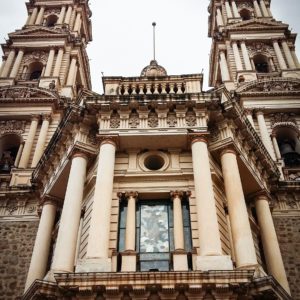
Uncover secret beauty hiding in plain sight with Theology of Sacred Architecture taught by Professor Erik Bootsma in the approaching Fall II term.
Class begins October 24th and registration is already open!
Theology of Sacred Architecture introduces the history, theology and symbolism of Catholic sacred architecture, focusing on how its development has affected the shape, configuration and use of the Catholic Church throughout various architectural styles and eras.
The class will trace the Church’s development from Pagan and Old Testament ideas of sacred architecture through the Middle Ages, Renaissance, Counter-Reformation and Vatican II.
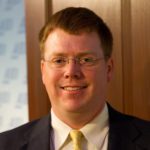
Professor Bootsma is a prominent architect, lecturer and commentator. His work on sacred and classical architecture has appeared in journals and outlets such as First Things, Crisis Magazine, Catholic World Report, Adoremus and Catholic News Agency.
He has also lectured at the Catholic Art Guild, the Hillsdale College Kirby Center, the University of Notre Dame, Franciscan University of Steubenville and The Catholic University of America.
He holds a Master of Architecture degree from the University of Notre Dame School of Architecture and an undergraduate degree in Liberal Arts from Thomas Aquinas College in California. He is a registered architect in the state of Virginia and has been in private practice since 2014, focusing on ecclesiastical architecture.
The cross-listed course (HUM 260 & THEO 290/590) fulfills Humanities or Theology credits at the undergraduate level or graduate level. Students will learn to:
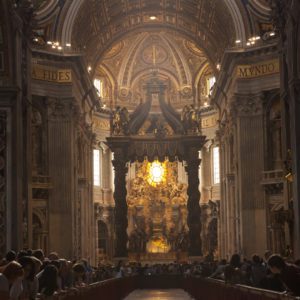
- Articulate the major periods of development in Catholic sacred architecture.
- Identify the essential parts of a church and their theological symbolism, particularly the baptistry, the sanctuary, the altar and the tabernacle and the liturgical celebrations proper to each.
- Have general knowledge of the various documents touching on sacred architecture and general knowledge of the canonical and conciliar decrees about sacred Architecture and the liturgy.
- Evaluate the effectiveness and appropriateness of a given design in communicating theology of the Catholic Faith.
Those interested in understanding the role of sacred architecture and art in the Catholic Church’s theology and liturgy should complete their application quickly as registration is already underway for the Fall II term, which begins October 24th. There is no application fee!



